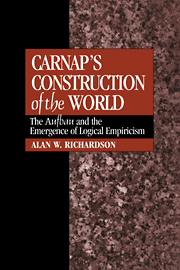Book contents
- Frontmatter
- Contents
- Acknowledgments
- Introduction
- 1 Reconstructing the Aufbau
- 2 The problem of objectivity: An overview of Carnap's constitutional project
- 3 An outline of the constitutional projects for objectivity
- 4 The background to early Carnap: Themes from Kant
- 5 The fundamentals of neo-Kantian epistemology
- 6 Carnap's neo-Kantian origins: Der Raum
- 7 Critical conventionalism
- 8 Epistemology between logic and science: The essential tension
- 9 After objectivity: Logical empiricism as philosophy of science
- Bibliography
- Index
6 - Carnap's neo-Kantian origins: Der Raum
Published online by Cambridge University Press: 30 October 2009
- Frontmatter
- Contents
- Acknowledgments
- Introduction
- 1 Reconstructing the Aufbau
- 2 The problem of objectivity: An overview of Carnap's constitutional project
- 3 An outline of the constitutional projects for objectivity
- 4 The background to early Carnap: Themes from Kant
- 5 The fundamentals of neo-Kantian epistemology
- 6 Carnap's neo-Kantian origins: Der Raum
- 7 Critical conventionalism
- 8 Epistemology between logic and science: The essential tension
- 9 After objectivity: Logical empiricism as philosophy of science
- Bibliography
- Index
Summary
the neo-Kantian themes uncovered in Chapter Five provide an entry point to Carnap's thinking about epistemological and methodological issues throughout the 1920s. Carnap's dissertation, Der Raum (Space; hereafter Raum), written and defended in 1921 and published in 1922, shows him to be an unabashed, if unorthodox, neo-Kantian about space. His views show many similarities to the account of physical methodology we saw in Cassirer, especially as regards the distinction between the universal and relativized synthetic a priori. There are, of course, differences, which stem largely from Carnap's commitment to Russellian logicism and from his more detailed understanding of the technical physical and mathematical issues. In this chapter and the next, our goal is to use the framework for thinking about neo-Kantianism to investigate Carnap's evolving thought in his pre-Aufbau period. We shall see that in Carnap's work, also, there is an attempt to tie the methodological synthetic a priorito a logic of objective knowledge. Conventionalism in mathematical physics, combined with a desire to have a scientific understanding of philosophy itself, leads ultimately to the problems Carnap finds in explaining the relation among objectivity, intersubjectivity, and logical form in the Aufbau.
This chapter is given over entirely to an outline of the theories about space and geometry that Carnap presents in his dissertation. Chapter Seven provides a brief examination of the main themes of the essays on the methodology of physics that he published during the years (1922–6) when he was writing the Aufbau. At no point in any of these essays does Carnap endorse anything that looks like strict empiricism.
- Type
- Chapter
- Information
- Carnap's Construction of the WorldThe Aufbau and the Emergence of Logical Empiricism, pp. 139 - 158Publisher: Cambridge University PressPrint publication year: 1997



